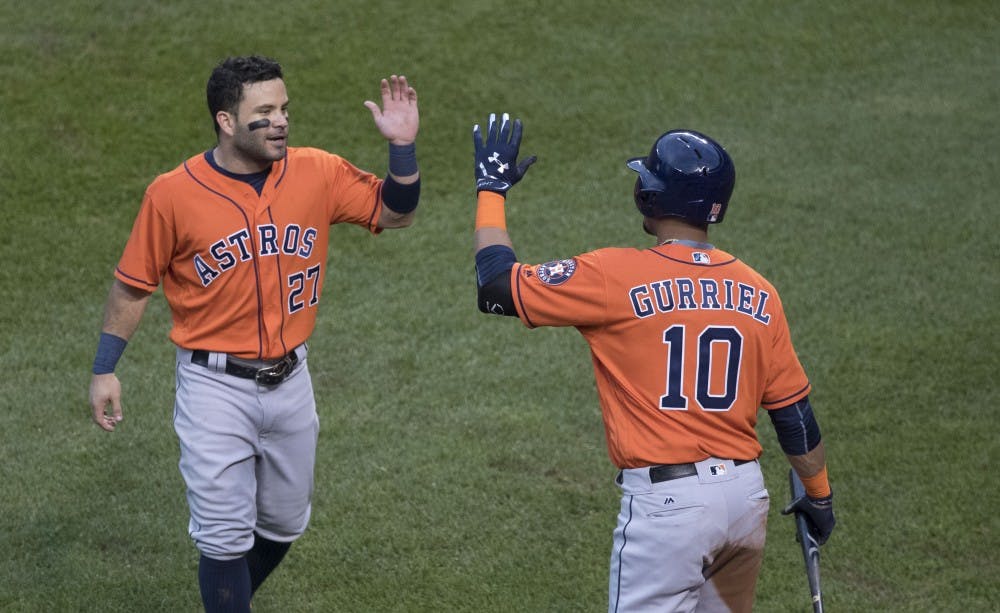
For the second straight year, a team broke a 50-plus-year World Series drought, with the Houston Astros beating the Los Angeles Dodgers in a riveting seven-game series. It was the first championship for the Astros, who first joined the MLB as the Houston Colt .45s in 1962.
While that first game did not have quite the level of theatrics other games had, it had lots of home runs, which was a theme of the entire series.
The series did not start off well for the Astros, as Chris Taylor sent the first pitch the Astros threw into the seats for a home run off of Dallas Keuchel.
In the fourth inning, Houston’s Alex Bregman hit his first of what would be six home runs to tie the game, which is a new World Series record.
Not to be outdone, the Dodgers responded in the bottom of the sixth with a two-run homer from Justin Turner that would end up being the difference. It was the first of eight home runs to give a team the lead, which is also a World Series record.
After game one, the real fun began. Game two proved to be one of the best games in not only World Series history, but in my opinion, all of baseball history.
While the Astros struck first with a run in the third inning, Los Angeles’ Joc Pederson got the Dodgers’ first hit of the game off of Justin Verlander in the fifth inning with a home run to tie the game. The next inning, Cory Seager got the Dodgers’ second hit of the game with a two-run home run to give his team a two-run lead.
With the Dodgers’ bullpen in the game, most people thought the game was over and the Dodgers would take a 2-0 lead in the series.
Their bullpen had been virtually unhittable the entire postseason, which is part of the reason why manager Dave Roberts pulled starter Rich Hill after only four innings and 60 pitches.
In the eighth inning, however, they finally showed they were human. Roberts brought in star closer Kenley Jansen to try and save the inning after a leadoff double by the Astros’ third baseman, Alex Bregman.
While Jansen got American League MVP José Altuve to ground out, he could not get past Carlos Correa, who hit an RBI single up the middle to bring the Astros within one run.
In the ninth, Marwin González led off and had what I believe was the most important at-bat of the series. With no balls and two strikes on him, Gonzalez hit a line drive to center field that got over the fence to tie the game.
That at-bat was essential to the Astros, because it was the first sign that Kenley Jansen was not perfect. It was the first earned run he gave up the entire postseason, which eventually would help swing what could have been a 2-0 deficit into a 1-1 series.
In extra-innings, the real mayhem began. The Astros hit three home runs in the extra frames, while the Dodgers hit two. The two runs the Astros scored in the 10th were answered by the Dodgers thanks in part to a home run by Yasiel Puig.
In the 11th, eventual World Series MVP George Springer would hit his first of five home runs in the series. Though the Dodgers got a home run from Charlie Culberson in the bottom of the inning, they could not overcome the Astros, and the series got tied at 1-1.
The game involved eight home runs, five of which either tied the game or gave the team the lead. Six of the home runs also occurred in the ninth inning or later — all of which are World Series records.
The series was now set at 1-1, as both teams flew to Houston for games three through five.
While game three was not quite as dramatic as game two, it started right where game two left off, as Yuli Gurriel hit a solo home run in the second inning to start off the scoring. The Astros rode the momentum and had three more runs, putting them up 4-0 and getting Yu Darvish out of the game.
The Astros held their lead, relying on the great pitching of Lance McCullers Jr. and Brad Peacock to hold the potent Dodgers offense to only three runs and four hits, taking a 2-1 lead in the series.
The next night was a pitcher’s duel for the first eight innings, as the Astros only managed one hit — a home run of course — and the Dodgers only managed four hits. Neither team had any runs for the first eight innings of the game.
The ninth inning, however, was dominated by the Dodgers. They scored five runs in the inning, capped off by a three-run home run by Pederson. The Astros attempted to come back in the bottom of the ninth, as Bregman hit a home run to inch them closer, but the deficit was too large for them to overcome, and the Dodgers tied the series at two with the 6-2 win over the Astros.
Game five was the wildest of them all. The Dodgers came out swinging, scoring three runs in just the first inning. They eventually stretched their lead to four before the Astros stormed back with four runs of their own in the bottom of the fourth, thanks to the three-run home run by Gurriel that tied up the game.
From there on, it was absolute mayhem. L.A.’s star rookie Cody Bellinger hit a three-run home run, and the two teams continued to trade home runs back and forth, with three by the Astros and one by the Dodgers.
The game eventually went to extra innings when the Dodgers scored three runs in the ninth to tie the game. In the 10th inning, the Astros put together a two-out rally and eventually won on a walk-off single by Bregman.
The seven home runs in the game pushed the home run total for the series to 22, breaking the previous World Series record. It also saw the seventh different Astros player, Brian McCann, to homer in the series. Combined with the seven Dodgers players who hit home runs, this is the largest number of players to homer in a single World Series.
Game six managed to come back to Earth after the absurdities in game five. The Astros hit their typical George Springer home run to open up the scoring in the third. The Dodgers were held in check by pitcher Justin Verlander until the sixth inning, when they used two hits and a hit-by-pitch to scratch across two runs and take the lead.
They added an insurance run in the seventh on Joc Pederson’s third homer of the Series. The Dodgers trusted Jansen on the mound to get a six-out save after he had given up runs in his three previous appearances against the Astros. The day off, combined with being back at home, obviously helped Jansen, as he got all six outs in just 20 pitches to force a game seven.
After a leadoff double by Springer, Bellinger made a throwing error to score the first run of the game. After a stolen base, Altuve’s ground out gave them a 2-0 lead.
The second inning went just as poorly for the Dodgers, with the Astros scoring three more runs to take a 5-0 lead on the back of another home run by Springer.
The Astros used a medley of pitching to secure the lead. McCullers went two and one third before being pulled for Brad Peacock. After using both Francisco Liriano and Chris Devenski for one out, Charlie Morton pitched a stellar final four innings to win it all.
This series was the best World Series I have ever seen because of all the drama and action that went into the games. Past years dominated by pitching are fun to some people, but everyone loves home run filled games. It may be because of different baseballs, and if the baseballs are truly different I think it is unfair to pitchers.
With so many pitchers complaining about the balls, it is hard for me to believe that there really is no difference between the playoff baseballs and the regular season baseballs.
With great pitchers such as Yu Darvish pitching completely out of character, something seems fishy. Darvish has pitched in the playoffs before, so it cannot be just nerves that caused him to give up eight earned runs in only three and one third innings pitched in the World Series.
No matter why the home run numbers are increasing, there is definitely a shift in the style of baseball being played. Just three years ago, there were nearly 2000 fewer home runs hit than this year.
This style of play is much more exciting than the no-hitters and perfect games thrown in 2014, and that resulted in one of the best World Series in the history of baseball.





